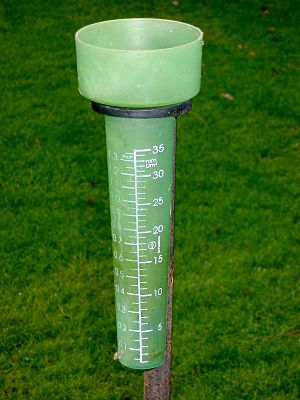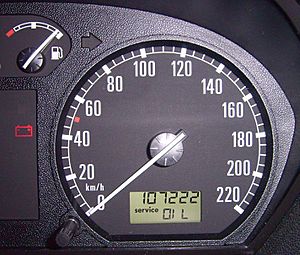Gauge facts for kids
A gauge is a special tool or display that shows a measurement. Think of it like a dashboard for information! Gauges help us see how much of something there is, or how fast something is moving. They often have a dial with a needle, or a digital screen with numbers.
Contents
What is a Gauge?
A gauge is a device used to measure and display a specific quantity. It takes information from a sensor and shows it in an easy-to-understand way. This could be how hot something is, how much pressure is in a tire, or how much fuel is left in a tank.
Why are Gauges Important?
Gauges are super important for safety and for making good decisions. For example, a car's fuel gauge tells you when to get gas. A thermometer (which is a type of gauge) tells you if you have a fever. Without gauges, we wouldn't know many important facts about our world or our machines.
Different Kinds of Gauges
There are many types of gauges, each designed for a specific job.
Weather Gauges
- Rain gauge: This measures how much rain has fallen over a certain time. It helps meteorologists (weather scientists) understand rainfall patterns.
- Thermometer: This measures temperature. We use them to check the weather, cook food, or see if we are sick.
- Barometer: This measures air pressure. Changes in air pressure can help predict weather changes.
Vehicle Gauges
- Speedometer: Found in cars and other vehicles, this gauge shows how fast you are driving. It helps drivers stay safe and follow speed limits.
- Fuel gauge: This tells you how much fuel is left in your vehicle's tank.
- Tachometer: This gauge shows how fast an engine's parts are spinning. It helps drivers shift gears at the right time.
- Oil pressure gauge: This shows the pressure of the engine oil. It's important for keeping the engine healthy.
Industrial Gauges
- Pressure gauge: These are used in many industries to measure the pressure of liquids or gases in pipes or tanks. They are vital for safety in factories and power plants.
- Flow meter: This measures how much liquid or gas is moving through a pipe.
- Level gauge: This shows the amount of liquid or material inside a tank or container.
How Do Gauges Work?
Gauges work in different ways depending on what they measure.
- Some gauges are mechanical. For example, a simple pressure gauge might use a spring that moves a needle when pressure changes.
- Other gauges are electrical or digital. They use sensors that convert a physical measurement (like temperature or speed) into an electrical signal. This signal is then shown as numbers on a screen or by moving a needle on a dial. Modern cars often have digital dashboards that show many different gauge readings.
See also
 In Spanish: Gauge para niños
In Spanish: Gauge para niños
 | Kyle Baker |
 | Joseph Yoakum |
 | Laura Wheeler Waring |
 | Henry Ossawa Tanner |



